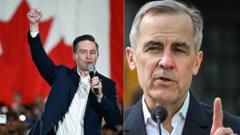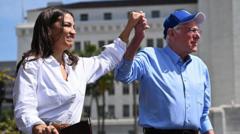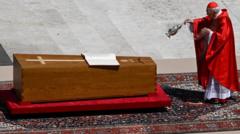Alberta is witnessing a surge in separatist sentiments, fueled by dissatisfaction with longstanding Liberal governance. Proponents argue for greater autonomy, with discussions on both independence and possible integration with the United States gaining attention among locals.
Alberta's Growing Calls for Independence: A Response to Federal Discontent

Alberta's Growing Calls for Independence: A Response to Federal Discontent
In a region feeling overshadowed by Eastern Canada, Alberta's push for independence gains traction against a backdrop of discontent with federal policies.
The voices calling for Alberta's independence are becoming increasingly pronounced as frustrations mount against perceived neglect from federal leadership. During a recent gathering in Lethbridge, a large portion of attendees expressed support for severing ties with the rest of Canada, citing a cultural and economic disconnect.
Retired heart surgeon Dennis Modry, co-leader of the Alberta Prosperity Project, is at the forefront of this movement. He highlights a growing sentiment among Albertans that they share more values with their American neighbors, particularly in regions like Montana and Texas, than with the eastern provinces of Canada. "How many people would like Alberta to join the US?" he asked, sparking a notable response from the crowd.
The impact of U.S. President Trump’s rhetoric suggesting Canada might become the 51st state has further ignited discussions of separation in Alberta. This has prompted some to contemplate Alberta's future, including a potential independence referendum.
The current political landscape is fraught with challenges for western Canadians, who often feel overlooked by political leaders operating from Ottawa. This sentiment is compounded by policies from the Prime Minister's office that many in the oil-rich province believe threaten their economic interests. Liberal policies, particularly under former Prime Minister Justin Trudeau, have left some feeling that their voices are unheard.
Recent polling suggests that while a minority of Albertans support full independence from Canada, many agree that their province deserves more representation and consideration in national discussions. Leaders like Alberta Premier Danielle Smith are taking a firm stance, indicating that if their demands for policy changes are unmet, a crisis of national unity could ensue.
Despite a growing support base for separatist rhetoric, opinions on the practicalities of independence remain mixed among the populace. Some, such as Judy Schneider, support the idea of an independence referendum, reflecting deep-seated frustration with how Alberta's interests are managed at the federal level.
Conversely, others argue for a more collaborative approach within Canada, emphasizing that unity is stronger than division. Local businessman Steve Lachlan expressed concern over separation ideas, saying, "We already have separation, and we need to come together."
As Alberta navigates this complex political landscape, the challenges posed by a divided electorate may be significant for Canada's future leadership, particularly with potential upcoming elections. Even if Conservative leader Pierre Poilievre were to assume governance, the intricate divides between eastern and western Canada remain unresolved.
The situation is further evolving, with Alberta’s grassroots movements seeking to capture attention at the federal level, while reminders of shared Canadian identity persist amidst rising calls for autonomy. Whether Alberta can successfully negotiate its desires with Ottawa remains uncertain, as the province grapples with its identity and future.
Retired heart surgeon Dennis Modry, co-leader of the Alberta Prosperity Project, is at the forefront of this movement. He highlights a growing sentiment among Albertans that they share more values with their American neighbors, particularly in regions like Montana and Texas, than with the eastern provinces of Canada. "How many people would like Alberta to join the US?" he asked, sparking a notable response from the crowd.
The impact of U.S. President Trump’s rhetoric suggesting Canada might become the 51st state has further ignited discussions of separation in Alberta. This has prompted some to contemplate Alberta's future, including a potential independence referendum.
The current political landscape is fraught with challenges for western Canadians, who often feel overlooked by political leaders operating from Ottawa. This sentiment is compounded by policies from the Prime Minister's office that many in the oil-rich province believe threaten their economic interests. Liberal policies, particularly under former Prime Minister Justin Trudeau, have left some feeling that their voices are unheard.
Recent polling suggests that while a minority of Albertans support full independence from Canada, many agree that their province deserves more representation and consideration in national discussions. Leaders like Alberta Premier Danielle Smith are taking a firm stance, indicating that if their demands for policy changes are unmet, a crisis of national unity could ensue.
Despite a growing support base for separatist rhetoric, opinions on the practicalities of independence remain mixed among the populace. Some, such as Judy Schneider, support the idea of an independence referendum, reflecting deep-seated frustration with how Alberta's interests are managed at the federal level.
Conversely, others argue for a more collaborative approach within Canada, emphasizing that unity is stronger than division. Local businessman Steve Lachlan expressed concern over separation ideas, saying, "We already have separation, and we need to come together."
As Alberta navigates this complex political landscape, the challenges posed by a divided electorate may be significant for Canada's future leadership, particularly with potential upcoming elections. Even if Conservative leader Pierre Poilievre were to assume governance, the intricate divides between eastern and western Canada remain unresolved.
The situation is further evolving, with Alberta’s grassroots movements seeking to capture attention at the federal level, while reminders of shared Canadian identity persist amidst rising calls for autonomy. Whether Alberta can successfully negotiate its desires with Ottawa remains uncertain, as the province grapples with its identity and future.




















